Reactant - Study guides, Class notes & Summaries
Looking for the best study guides, study notes and summaries about Reactant? On this page you'll find 1926 study documents about Reactant.
Page 3 out of 1.926 results
Sort by
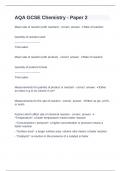
-
AQA GCSE Chemistry Question and answers 100% correct 2024
- Exam (elaborations) • 46 pages • 2024
-
Available in package deal
-
- $15.49
- + learn more
AQA GCSE Chemistry Question and answers 100% correct 2024 Mean rate of reaction (with reactant) - correct answer Rate of reaction: Quantity of reactant used ---------------------------- Time taken Mean rate of reaction (with product) - correct answer Rate of reaction: Quantity of product formed ---------------------------- Time taken Measurements for quantity of product or reactant - correct answer Either as mass in g or as volume in cm³ Measurements for the rate of rea...
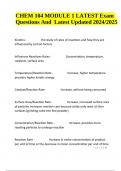
-
CHEM 104: General Chemistry II MODULE 1 Exam Questions And Answers Latest Updated 2024/2025
- Exam (elaborations) • 16 pages • 2024
-
- $13.99
- + learn more
CHEM 104: General Chemistry II MODULE 1 Exam Questions And Latest Updated 2024/2025. Temperature/Reaction Rate - Increase, higher temperature provides higher kinetic energy Catalyst/Reaction Rate - Increase, without being consumed Surface Area/Reaction Rate - Increase, increased surface area of particles increases reaction rate because solids only react at their surfaces (grinding solid into fine powder) Concentration/Reaction Rate - Increase, provides more reacting particles to undergo r...
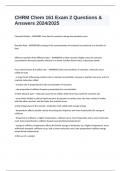
-
CHRM Chem 161 Exam 2 Questions & Answers 2024/2025
- Exam (elaborations) • 12 pages • 2024
-
Available in package deal
-
- $8.99
- + learn more
CHRM Chem 161 Exam 2 Questions & Answers 2024/2025 Chemical Kinetics - ANSWERS- how fast the reactants change into products occur Reaction Rate - ANSWERSthe change in the concentrations of reactants (or products) as a function of time Different reactions have different rates: - ANSWERSin a faster reaction (higher rate), the reactant concentration decreases quickly, whereas in a slower reaction (lower rate), it decreases slowly Four control factors that affect rate: - ANSWERS1) the ...
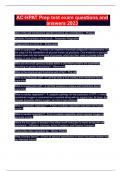
-
AC-HPAT Prep test exam questions and answers 2023
- Exam (elaborations) • 11 pages • 2023
-
- $11.49
- 2x sold
- + learn more
Most of the cell membrane's specific functions are controlled by: - Proteins Alcoholic Fermentation is a form of: - Anaerobic Respiration Phagocytosis is a form of: - Endocytosis What is a pyruvate? - Pyruvate is an important chemical compound in biochemistry. It is the output of the metabolism of glucose known as glycolysis. One molecule of glucose breaks down into two molecules of pyruvate, which are then used to provide further energy, in one of two ways. What are the small spher...
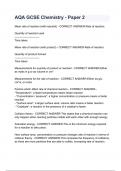
-
AQA GCSE Chemistry - Paper 2 Questions & answers
- Exam (elaborations) • 36 pages • 2024
- Available in package deal
-
- $7.99
- + learn more
Mean rate of reaction (with reactant) - CORRECT ANSWER-Rate of reaction: Quantity of reactant used ---------------------------- Time taken Mean rate of reaction (with product) - CORRECT ANSWER-Rate of reaction: Quantity of product formed ---------------------------- Time taken Measurements for quantity of product or reactant - CORRECT ANSWER-Either as mass in g or as volume in cm³ Measurements for the rate of reaction - CORRECT ANSWER-Either as g/s, cm³/s, or mol/s Factors which af...
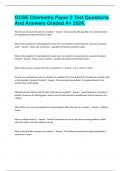
-
GCSE Chemistry Paper 2 Test Questions And Answers Graded A+ 2024.
- Exam (elaborations) • 26 pages • 2024
-
Available in package deal
-
- $9.99
- + learn more
How do you measure the rate of a reaction? - Answer By measuring the quantity of a reactant used or the quantity of product formed over time What is the equation for calculating the mean rate of a reaction by measuring the amount of reactant used? - Answer Mean rate of reaction = quantity of reactant used/time taken What is the equation for calculating the mean rate of a reaction by measuring the amount of product formed? - Answer Mean rate of reaction = quantity of product formed/ti...
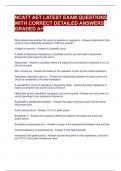
-
NCATT AET LATEST EXAM QUESTIONS WITH CORRECT DETAILED ANSWERS GRADED A+
- Exam (elaborations) • 30 pages • 2024
-
Available in package deal
-
- $13.99
- + learn more
NCATT AET LATEST EXAM QUESTIONS WITH CORRECT DETAILED ANSWERS GRADED A+ What determines whether the vector is positive or negative is - Answer-determined if the circuit is more capacitate reactant or inductive reactant Voltage is common - Answer-in a parallel circuit If asked to determine impedance in a parallel cuircuit, you will need to determine - Answer-the total current in the circuit Resonance - Answer-a condition where the capacitive and inductive reactance of an LC circuit a...
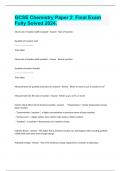
-
GCSE Chemistry Paper 2 Final Exam Fully Solved 2024.
- Exam (elaborations) • 37 pages • 2024
-
Available in package deal
-
- $8.99
- + learn more
Mean rate of reaction (with reactant) - Answer Rate of reaction: Quantity of reactant used ---------------------------- Time taken Mean rate of reaction (with product) - Answer Rate of reaction: Quantity of product formed ---------------------------- Time taken Measurements for quantity of product or reactant - Answer Either as mass in g or as volume in cm³ Measurements for the rate of reaction - Answer Either as g/s, cm³/s, or mol/s Factors which affect rate of c...
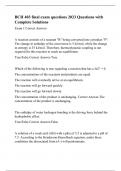
-
BCH 403 final exam questions 2023 Questions with Complete Solutions
- Exam (elaborations) • 52 pages • 2024
-
- $14.99
- + learn more
Exam 1 Correct Answer- A reaction consists of a reactant "R" being converted into a product "P". The change in enthalpy of the conversion is 5 kJ/mol, while the change in entropy is 35 kJ/mol. Therefore, thermodynamic coupling is not required for this reaction to reach an equilibrium. True/False Correct Answer-True Which of the following is true regarding a reaction that has a ΔG° = 0. The concentrations of the reactants and products are equal. The reaction will eventually arriv...
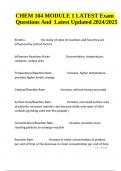
-
CHEM 104 MODULE 1 Exam Questions And Answers Updated 2024/2025 | 100% Correct.
- Exam (elaborations) • 16 pages • 2024
-
- $16.49
- + learn more
CHEM 104 MODULE 1 Exam Questions And Answers Updated 2024/2025 | 100% Correct. Kinetics - the study of rates of reactions and how they are influenced by certain factors Influences Reactions Rates - Concentration, temperature, catalysts, surface area Temperature/Reaction Rate - Increase, higher temperature provides higher kinetic energy Catalyst/Reaction Rate - Increase, without being consumed Surface Area/Reaction Rate - Increase, increased surface area of particles increases reaction ra...

How did he do that? By selling his study resources on Stuvia. Try it yourself! Discover all about earning on Stuvia


